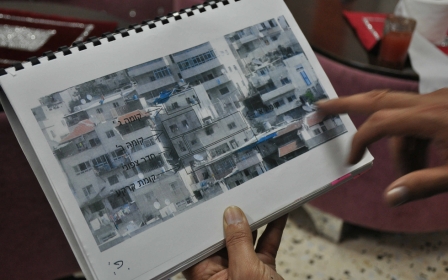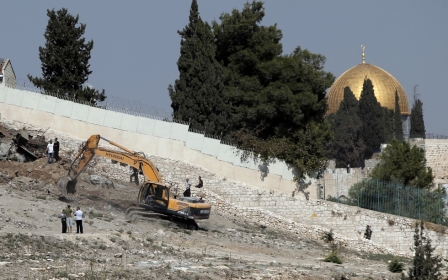Israel approves construction of 'Disneyland' cable car in Jerusalem
Israel approved on Tuesday a plan to build a cable car that critics say would dramatically alter the scenery of the historic Old City of Jerusalem and help develop a Jewish settlement in a Palestinian neighbourhood, Israeli daily Haaretz reported.
According to Haaretz, Israel's national infrastructure committee, the Jerusalem development authority and the ministry of tourism have together earmarked 200 million shekels ($54.4m) for the project, which would connect the city's west and east sides.
Israel says the cable car would help ease traffic in the city and could transport 3,000 passengers an hour at peak times.
Two stations are proposed to be built in West Jerusalem and Mount Zion. A third is planned in occupied East Jerusalem's Silwan neighbourhood, adjacent to the southern wall of the Old City and close to al-Aqsa Mosque.
Their aim is reduce the Palestinian population in Jerusalem
- Sahar Abbasi, Silwan resident
The area of East Jerusalem this station is to be built in, which Israel captured in 1967 and has occupied ever since, is controlled by settler group ELAD, which manages the City of David archaeological park and builds Jewish settlements in the neighbourhood.
Several Palestinian families who have lived in the neighbourhood for generations have been evicted from the area by Israel to create the archaeological park and accommodate Jewish settlers.
Sahar Abbasi, a resident of Silwan, told Middle East Eye that residents were not shocked the project was approved as they have been hearing that plans to authorise it had been set.
“Their aim is reduce the Palestinian population in Jerusalem. Over the next 20 years they are intending to reduce the number of residents in Silwan and make the population 40 percent Jewish,” Sahar said.
“They call it a silent transfer but it is not silent, we hear these transfer plans through laws and projects approved by the Israeli government.”
'A kind of Disneyland'
Emek Shaveh, an Israeli archaeological NGO, warned the historic centre of Jerusalem, which is packed with centuries-old buildings, will be blighted by the modern cable car.
"Critics have ... stated that the cable car would commercialise Jerusalem, turning it into a kind of Disneyland, and will damage its famous beautiful skyline," it said in 2017.
The project will include 15 concrete pillars 26 metres high, Haaretz reported.
The NGO noted the plan would attempt to make the area developed by ELAD the main entrance through which tourists enter the Old City, gravitating tourist traffic away from the historically major Damascus Gate on the Palestinian side towards the Western Wall and Jewish quarter.
According to Haaretz, the cable car will have 73 carriages, each able to carry tens of passengers. From start to finish the system will be 1.4km long, and carriages will travel automatically 15-20 minutes apart. The journey is projected to last four and a half minutes in total.
Haaretz reported that doubts over the financial value of the project have been raised, as the Jerusalem development authority refuses to publish expected profits.
New MEE newsletter: Jerusalem Dispatch
Sign up to get the latest insights and analysis on Israel-Palestine, alongside Turkey Unpacked and other MEE newsletters
Middle East Eye delivers independent and unrivalled coverage and analysis of the Middle East, North Africa and beyond. To learn more about republishing this content and the associated fees, please fill out this form. More about MEE can be found here.




